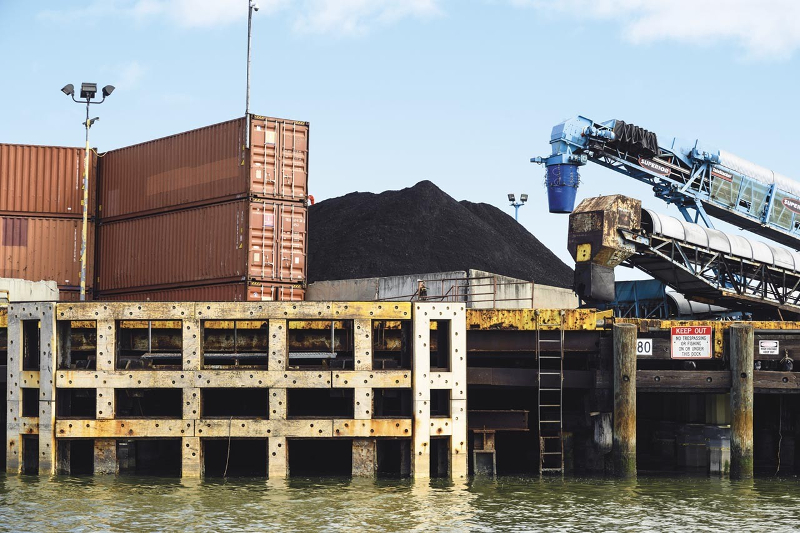New proof: coal trains spread toxic PM2.5 pollution in Richmond, CA
Coal trains passing through a Richmond, California neighborhood on their way to the Levin Terminal add significantly more toxic particulate matter (PM2.5) to the atmosphere than other freight or passenger trains, according to a new, peer-reviewed scientific study published this month in Springer Nature’s Air Quality, Atmosphere, and Health, an international, interdisciplinary journal. The term PM2.5 refers to particles in the air that are two-and-one-half microns wide or smaller. There are one million microns in a meter; one micron is approximately 1/25,000 of an inch.
Authors of the Richmond-based study cite prior research establishing that “exposure to PM2.5 has been linked to premature mortality, cardiovascular, cerebrovascular, and respiratory diseases, other chronic diseases, adverse birth outcomes, and cognitive and developmental impairments.” Further, they note that “the World Health Organization recently lowered their air quality guidelines and indicated there is no known safe level of PM2.5.”
“The impact of coal trains on PM2.5 in the San Francisco Bay area” adds significant new and local weight to scientific evidence presented to the Oakland City Council in 2015 & 2016, and examined in the Federal court case OBOT v. City of Oakland. In that 2018 case, U.S. District Court Judge Vince Chhabria questioned whether evidence entered into the record prior to the Oakland City Council’s vote to ban storage and handling of coal in the city was substantial enough to meet a specific legal standard, and ultimately ruled against Oakland’s application of its coal ban to the West Gateway project (while leaving the coal ban ordinance itself intact).
The new study confirms and strengthens the evidence submitted to the Oakland City Council (which included papers cited by the new study as references), and at the same time provides new evidence of PM2.5 dispersion from trains that (i) are carrying coal of the same type and provenance that developers propose to ship through Oakland’s West Gateway; and (ii) are operating locally in the East Bay, a mere fifteen miles north of the West Gateway site. This new evidence addresses many if not most of Judge Chhiabra’s 2018 concerns.
Key findings from the new study include:
- There is “evidence of significant increases in PM2.5 due to passing coal-carrying trains in Richmond, California.”
- “The observed increases were greater than those produced by freight trains and passenger trains.”
- “Unloaded coal cars also generated increases in PM2.5, but at lower concentrations than full coal cars.”
- “Quantifying the contribution of coal trains in urban air populations is important since vulnerable communities are typically found in close proximity to rail lines. In addition, inevitable dispersion of PM2.5 will increase population exposure over a much wider area. Since shipment of coal by train occurs throughout the world and for many urban areas, it represents a significant public health hazard.”
Quantified findings describing the amount of PM2.5 added to the air by coal trains include:
- “Coal trains add on average 8.32 µg/m3 (95% CI = 6.37, 10.28; p < 0.01) to ambient PM2.5, while sensitivity analysis produced midpoints ranging from 5 to 12 µg/m3.”
- “Coal trains contribute 2 to 3 µg/m3 more of PM2.5 than freight trains, and 7 µg/m3 more under calm wind conditions,” suggesting that the new study “underestimates emissions and subsequent concentrations of coal train dust.”
- The study’s “models suggest an increase of 17.4 µg/m3 (95% CI = 6.2, 28.5; p < 0.01) from coal trains” at peak concentrations of PM2.5, “about 3 µg/m3 more than freight trains.”
The new study – conducted and authored by Dr. Bart Ostro and Dr. Nicholas Spada of the UC Davis Air Quality Research Center, and Dr. Heather Kuiper of Oakland – was published in an “Open Access” journal, which means that anyone can access and evaluate the full paper.
No Coal in Oakland will schedule a Town Hall in the coming weeks so the community can hear directly from the scientists about the study’s findings and significance; and to provide an opportunity for Oaklanders to discuss how this new evidence might impact our ongoing campaign to prevent a coal terminal from poisoning the city’s waterfront and adjacent communities.
UPDATE: If you would like to participate in the online Town Hall where these new findings will be explained and discussed, please register here (your individualized Zoom link/URL will be sent to the e-mail address you provide on the registration form). The online Town Hall meeting will be held on April 26, 2023, from 5:30 to 7:00 pm.
Photo credit: Lance Yamamoto, Levin Terminal – Richmond, CA.
